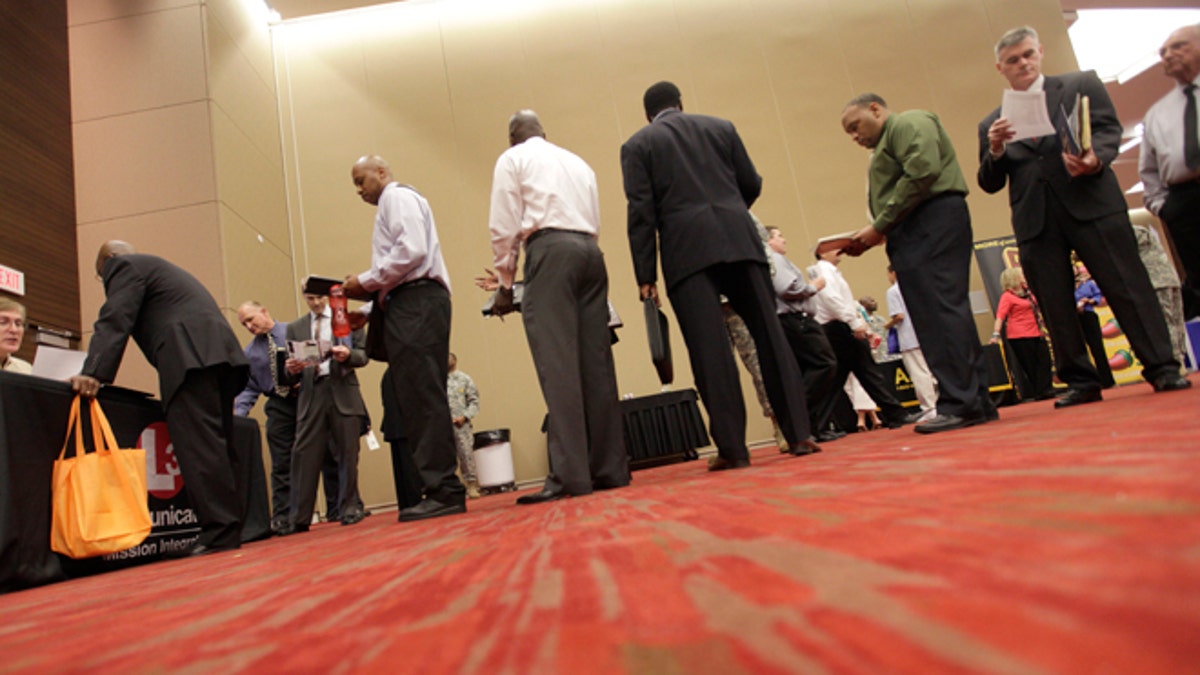
July 19, 2012: Job seekers line up to speak to a recruiter during a job fair in Irving, Texas. (AP)
While supporters of the Senate immigration bill tout a new analysis that shows the legislation would boost the economy and trim the deficit, critics are seizing on another, less rosy stat -- the average American wage would drop, and not recover for more than a decade.
The analysis from the Congressional Budget Office projected that, if the Senate bill passes, the influx of new immigrants would have the effect of slightly bringing down the average wage. Specifically, the estimate showed average wages for the entire labor force "would be 0.1 percent lower in 2023."
It would affect lower- and higher-skilled workers more than those in the middle of the spectrum.
The detail, included in a catalog of more positive statistics, was not lost on one of the bill's chief critics, Sen. Jeff Sessions, whose office blasted out the projection as evidence the bill would hurt the workforce.
"The wages of U.S. workers -- which should be growing -- will instead decline," Sessions, R-Ala., said. "It would be the biggest setback for poor and middle-class Americans of any legislation Congress has considered in decades."
Democrats, and some conservatives, disagree strongly with Sessions on that point. The CBO estimated that the bill would actually boost the economy -- or gross domestic product -- by 3.3 percent over the next decade, and by 5.4 percent the decade after that.
Wages would eventually rise, the office said, but not for roughly a dozen years. Effectively, the CBO said it would take time for the economy to catch up with the influx of workers.
"As the labor supply initially increased under the legislation, less capital would be available for each worker to produce output, and thus workers' output, on average, would be lower for a time. That decline would reduce average wages relative to those under current law," the report said.
Further, the changes would "cause the unemployment rate to be slightly higher for several years."
The CBO offered several caveats. First, it clarified that not all current U.S. residents would be worse off. Part of the decrease in wages would be attributed to new and lower-wage earners entering the economy -- which mathematically brings down the average wage.
And the report specified that the biggest impact would be felt for those workers at the low and high end of the spectrum, since immigration is typically greatest among least- and most-skilled workers.
In short, the CBO estimated that by 2033, those in the middle of the spectrum -- a mix of high school and college graduates -- would see a slight increase. However, those at the top and bottom of the income scale would still see a slight decrease.
At the same time, the 8 million or so unauthorized workers projected to gain legal status under the bill would on average see an increase in their wages, since they'd have access to better jobs.
The CBO report is considered a vital piece of evidence for both sides of the debate, as the Senate and House push separate immigration packages.
Supporters hailed its estimate that the bill would boost the economy, and reduce the deficit by $197 billion over 10 years.
Douglas Holtz-Eakin, a conservative economist and former CBO director, said the estimate shows "that reform is an economic policy opportunity."
"With Washington broke and America stuck in a jobless recovery, the CBO report proves that immigration reform would be an unambiguous policy trifecta: higher growth, significantly reduced deficits, and a rational labor policy. This should put to rest any legitimate debate about the economic and fiscal implications of responsible immigration reform," he said.
While the Senate continued to debate its bill, a House panel on Tuesday approved its own version of immigration legislation, which has a stronger focus on enforcement.




